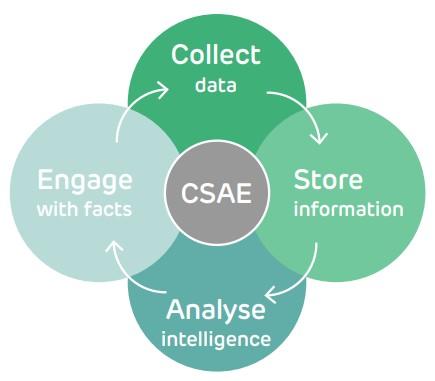
Credit: REPHRAIN
The white paper, published today (March 22) by REPHRAIN, the National Research Centre on Privacy, Harm Reduction and Adversarial Influence Online in collaboration with the Dutch National Police, offers a solution to big data problems that tend to hamper police probes into this type of law-breaking.
The practice of attribution – who did what – is becoming increasingly complex as organised crimes incorporate deception, deletion and encryption in today’s Information Age. Even when law enforcement are able to retrieve evidence via digital forensics, the complexities of the collected data mean it cannot be easily processed into factual police reports.
A frequently proposed solution is the introduction of ‘smart’ data science technologies to support criminal investigations. However, the transition to data scientific investigations requires legal, organisational and technical harmonisation with other public partners including a shared language of data scientific operations.
A Practitioner-in-Residence at REPHRAIN, together with partners at the Dutch National Police, have put together guiding principles and best practices for data scientific investigations of organised crime. These have been developed and put into practice by operational experts over several years, while connecting to existing law enforcement and industry standards. The associated framework is called CSAE (pronounced as ‘see-say’), a comprehensive framework that consists of a business process, methodology, policy agenda and public interest philosophy for data scientific operations. It stands for Collect, Store, Analyse and Engage.
CSAE is a living document and will continue to be updated and improved when the academic world, industry and law enforcement provide feedback on concepts and implementation. As CSAE is put into greater practice, additional lessons learned will be integrated into future versions. This will ensure CSAE is meeting the needs of law enforcement in the dynamic and challenging environment of crime and investigations.
Erik van de Sandt of the National Police, The Netherlands; University of Bristol, National Research Centre on Privacy, Harm Reduction and Adversarial Influence Online (REPHRAIN), said: “The Dutch National Police is known for executing technically complex operations. Over the years, our experts have developed, implemented and refined a new type of law enforcement operations that we call data scientific investigations. “
“We have experienced how our comprehensive data science framework promotes harmonization between law enforcement agencies as well as critical thinking by academics. It is because of this public interest philosophy that we share our framework with a broader audience. After all, both the effectiveness and legitimacy of criminal investigations are cornerstones of liberal democracies.”
###
REPHRAIN consolidates the UK’s considerable academic, industry, policy and third sector capabilities, and led by Bristol, provides a single body to engage with government, industry and citizens. The interdisciplinary team includes experts from the Universities of Bristol, Bath, Edinburgh, King’s College London and UCL, across a wide range of fields including – but not limited to – Computer Science, Law, Psychology and Criminology.
Paper:
“Towards Data Scientific Investigations: A Comprehensive Data Science Framework and Case Study for Investigating Organized Crime and Serving the Public Interest” and has been prepared by Erik van de Sandt, Arthur van Bunningen, Jarmo van Lenthe and John Fokker.
Media Contact
Laura Thomas
[email protected]




